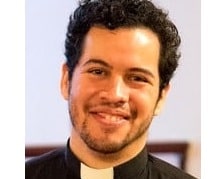On Monday in Holy Week, the Rev. Javier Almendárez-Bautista reflects on how the songs of Isaiah about a Messiah (Isaiah 42:1-9) continue to resonate in Holy Week.
Homilies (Page 11)
The Rev. George Adamik describes the richness of Holy Week, which begins with Palm Sunday and Jesus’s procession into Jerusalem.
The Rev. George Adamik reflects on John 12:20-33 and what it means to discover your true self, with spiritual insights from the Trappist monk Thomas Merton.
On the one-year anniversary of live-streaming services, the Rev. Javier Almendárez-Bautista reflects on Jesus’s enduring message of God’s love (John 3:14-21) in the darkest of times.
The Rev. Candy Snively describes how, one day, Jesus decides to interrupt “business as usual” at the temple (John 2:13-22): “We forget that we are the temple of God’s presence, we forget that all of creation is the residence of God, we forget that in whatever direction we might turn there’s the face of God. And as soon as we forget, life becomes business as usual.”
The Rev. George Adamik considers the Lenten call to self-examination and repentence: “For many, it feels like we’ve been in a continual Lent since last March, but I still feel like this Lenten season is calling me to something even more.”
On the First Sunday in Lent (2021), the Rev. Javier Almendárez-Bautista reflects on the brief description of Jesus’s baptism and temptation in the Gospel of Mark (Mark 1:9-15).
The Rev. George Adamik reflects on Jesus’s Transfiguration (Mark 9:2-9) as a story of hope amid suffering and overwhelming challenges.
The Rev. Javier Almendárez-Bautista discusses Paul’s surprising claim in 1 Corinthians 9:16-23 that he became all things to all people: “The Apostle Paul invites us into a new world. He invites us to become full-fledged citizens of no man’s land, that place that calls all our allegiances into question so that we might truly learn the ways and customs of another. And in this world that offers us impossible and inflexible choices about who we consider a worthwhile ally or a potential adversary, about who is worth our time and who isn’t, what would it look like for you choose otherwise? To become the kind of person willing to love those you weren’t supposed to love?”


